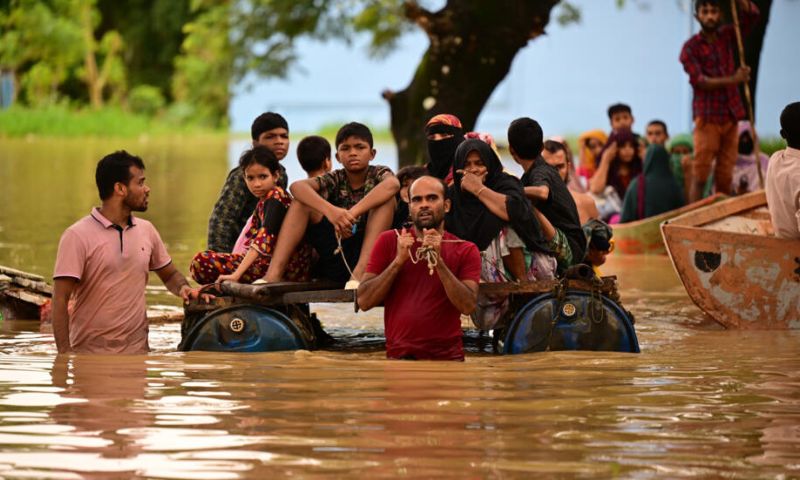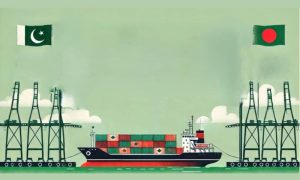DHAKA: Nearly 300,000 Bangladeshis have sought refuge in emergency shelters following catastrophic floods that have inundated vast areas of the South Asian country, disaster officials said on Saturday.
The severe flooding, triggered by heavy monsoon rains, has claimed at least 42 lives across Bangladesh since the beginning of the week, with many fatalities resulting from landslides.
Amid massive destruction, Mohammad Nahid Islam, an adviser to Bangladesh’s interim government, accused India of “non-cooperation,” blaming New Delhi for opening the sluice gates of Tripura dam “without any prior warning.” Nahid urged India to come out of what he described as an “anti-Bangladesh” policy.
Nahid Islam alleged that India was showing “inhumanity” by releasing water from its rivers without prior notice to Dhaka. Bangladesh and India share the waters of at least 54 rivers, with the upstream portions located in India.
Lufton Nahar, 60, described the dire situation from a relief shelter in Feni, one of the hardest-hit districts near the Indian border. “My house is completely inundated,” Nahar recounted. “Water is flowing above our roof. My brother brought us here by boat. If he hadn’t, we would have died.”
Bangladesh, a low-lying nation crisscrossed by numerous rivers, has faced recurrent flooding in recent decades. This year’s floods are exacerbated by shifting weather patterns due to climate change, which has intensified the frequency and severity of extreme weather events.
The floods have caused extensive damage to infrastructure, including highways and rail lines between the capital Dhaka and the main port city of Chittagong. This disruption has complicated access to severely affected areas and hampered business operations.
In addition to the human toll, the flooding comes amid a period of significant political turmoil. Just weeks ago, a student-led revolution led to the ousting of former autocratic leader Sheikh Hasina. The interim government, led by Nobel Peace Prize laureate Muhammad Yunus, is still establishing its footing.
The flooding has notably impacted Cox’s Bazar, a district housing approximately one million Rohingya refugees from Myanmar.
The crisis has also spilled over into India’s Tripura state, where the state disaster agency reported 24 deaths since Monday and around 65,000 people seeking shelter in 450 relief camps.
The ongoing disaster has also sparked diplomatic tensions. Asif Mahmud, a leader of the recent student protests now serving in Yunus’ caretaker cabinet, has accused India of exacerbating the flood crisis by intentionally releasing water from its dams. This accusation has fueled protests in Dhaka, where demonstrators have expressed outrage against India, accusing it of “water aggression.”
Hundreds of people also gathered at Dhaka University on Friday to protest against India’s “water aggression”, featuring a banner showing Indian Prime Minister Narendra Modi supposedly delighting at the sight of drowning people.
India’s foreign ministry has dismissed these allegations, attributing the increased water flow to automatic releases following the heaviest rains of the year in its own catchment areas.























